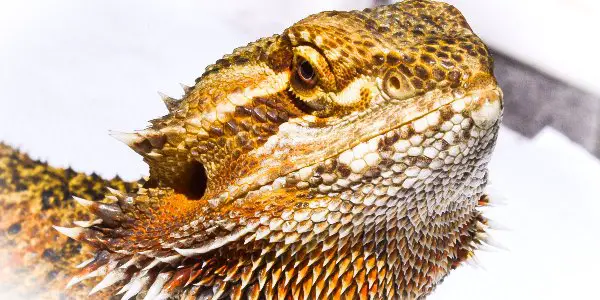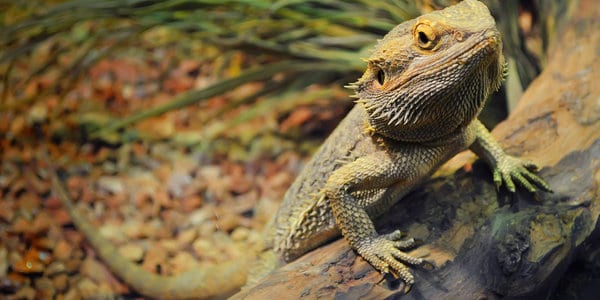Bearded dragons have a relaxed demeanor; however, all goes away when they arch their bodies in unusual positions while refusing to eat.
You may also wonder why your pet beardie is drastically losing weight when they contract Atadenovirus, otherwise known as the wasting disease. While some people refer to it as the Down’s syndrome of beardies, it is also commonly known as the stargazing disease.
Atadenovirus is contagious, especially among bearded dragons living in captivity, although it’s also been found in wild beardies. The viral disease spreads quickly among juvenile bearded dragons and has a high mortality rate. This guide covers everything you need to know about the stargazing syndrome, its symptoms, treatment, and prevention plan.
What Causes the Wasting Disease in Bearded Dragons?
Environmentally resistant adenovirus cause the “down’s syndrome” found in bearded dragons. While there are many virus strains that infect reptiles, they are species-specific but are highly transmissible among bearded dragons living in the same enclosure or household. The virus is mainly spread through fecal-oral routes.
Transmission can also occur if you handle grown beardies that might be infected but not showing symptoms and then handle juvenile and baby beardies that are highly susceptible to the virus.
Even in recovery bearded dragons, the virus is never entirely eliminated, and they will continue to shed the virus throughout their lifetime, potentially increasing the transmissibility.
Adults that have tested positive for adenovirus should not be used to breed as they will pass on the virus to the young ones. The great news is that not all beardies contract life-threatening symptoms when they have adenovirus.

Diagnosis and Symptoms of Adenovirus in Bearded Dragons
Adenovirus exhibits nonspecific signs during the initial stages of infection, and it’s nearly impossible to tell what’s wrong with your pet beardie until it’s too late to address the health complications.
This makes it much harder to diagnose young beardies, often requiring veterinarian intervention to conduct polymerase chain reaction (PCR) tests to confirm the presence of the disease. Here are some of the symptoms you should look out for:
Specific Symptoms
Dehydration
Adenovirus spreads quickly in the internal organs, causing cell necrosis in vital organs such as the liver, kidneys, and the intestinal lining. This dramatically affects the beardie’s natural abilities to regulate water retention in their body, causing dehydration.
You can tell that the beardie is dehydrated by looking for wrinkled skin with reduced elasticity, sunken eyes, and double strands of tacky saliva forming whenever the beardie opens its mouth.
Presence Of Coccidia
Coccidia parasites live in the inner linings of the bearded dragon’s intestines, just like humans have microbiota. In healthy beardies, these parasites are kept under control, but when it develops adenovirus infection, the parasite quickly grows out of control.
You can confirm the presence of coccidia by checking for smelly diarrhea that may constrain blood spots.
Concurrent Infections
As adenovirus spreads through the major organs, it weakens the beardie’s immunity leading to other concurrent infections. It’s common to diagnose salmonella infestation, microsporidiosis, listeriosis and hepatic lipidosis.
Neurological Signs
Bearded dragons with advanced ADV infection may exhibit neurological decline leading to what many refer to as “star gazing.” This happens when the beardie arches its neck looking upwards due to a loss of nervous control. These signs may advance to seizures and body twitching.
Nonspecific Symptoms
- Poor growth and weight loss
- Suboptimal husbandry
- Loss of appetite
- Weakness
- Kidney and liver disease

How Does Atadenovirus Spread?
Atadenovirus spreads through direct contact with an infected beardie and contact with contaminated tools and enclosures. The virus spreads quickly among juvenile beardies as their immunity is relatively low, and it can quickly spread out on an entire breeding colony and even in captive beardies.
Keep in mind that while some beardies do recover from the specific symptoms, they still shed the virus and can infect others during mating, sharing cages, and from the mother to her young ones.
How To Treat Atadenovirus?
Unfortunately, no known drug can cure atadenovirus; instead, the vets target specific symptoms. They use comprehensive treatment plans with the hope of keeping the beardie alive until its immunity is strong enough to keep the virus in check.
The sick beardie needs to be isolated and preferably raised alone in the household as any contact with healthy beardies will spread the infection. Isolation also eliminates any competition for food as the beardie may be too weak to feed immediately.
Ensure that the beardie’s cage stays warm and provides enough ultraviolet-B in the basking area.
If the beardie is unable to eat, you should provide highly digestible liquid meals with crushed insects, and you may have to place the food in its mouth. The meals should be supplemented with calcium and extra vitamins as the infection may have damaged the intestine reducing the absorption rates of these nutrients.
The beardie will get antifungal or antibiotic medications if the vet diagnoses a fungal and bacterial infection. You may counter liver failure with nutraceuticals and milk thistle. Dehydration symptoms can be dealt with by giving the beardie a daily bath in lukewarm water or even force-feeding with a syringe.

Adenovirus Prevention
Test The Beardie Before Breeding
The only way to prevent infected adult beardies from passing along the infection to young ones is to have the vet test them before breeding.
Only Keep Beardies in Hygienic Conditions.
To prevent the spread of adenovirus you need to practice good equipment and tank hygiene when raising bearded dragons. Make sure that any new beardies are kept in isolation for at least two weeks, pending checkups from the vet.
Ensure you wash your hands every time you handle any pet beardie and thoroughly clean the cages with bleach to eliminate any viruses.
Wrap Up
Bearded dragons with adenovirus may survive the initial infection if treated early. However, they will continue to shed the virus for the rest of their lives, and it recommends that any survivors be raised alone and not for breeding purposes.
When getting a bearded dragon, you should check for any unusual swellings on the body or erratic movements that might indicate the presence of neurological disorders caused by adenovirus.
